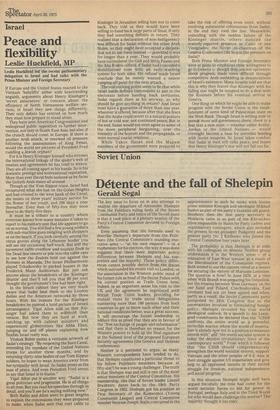Soviet Union
Detente and the fall of Shelepin
Gerald Segal
The key issue to focus on in any attempt to analyse the departure of Alexander Shelepin from the Politburo ruling body of the Soviet Communist Party and hence of the Soviet state is that it took place at a plenary session of the Party's Central Committee devoted to Foreign Affairs.
Even assuming that the formula used to describe Shelepin's departure from the Politburo (the Central Committee's standing executive arm) — "at his own request" — is a euphemism for his ejection, the way it was done suggests that there were important policy differences between Shelepin and his supporters and the majority. Those policy differences cannot possibly derive from the fracas which surrounded his recent visit to London, or the association in the Western public mind of his former role as head of the Secret Police with his current position as Trade Union boss. Indeed, in an important sense his visit to the UK and the agreement he negotiated with British Trade Union leaders, providing for mutual visits by trade union delegations numbering more than 100 persons from both countries to get to know each other and their national conditions better, was a great success. It will encourage the Soviet leadership to adduce this as proof that they are in favour of the "free exchange of people and information" and that there is therefore no reason for the Western powers to hold up the final signature at the Summit level of the proposed European Security agreements (the Geneva and Helsinki conferences).
Neither is it pertinent to argue, as many Western correspondents have tended to do, that Shelepin constituted a particular threat to his fellow Politburo members because at fifty-six(!) he was a young challenger. The truth is that Shelepin was and still is one of the most senior members of the Central Committee. His membership, like that of Soviet leader Leonid Brezhnev, dates back to the 19th Party Congress in 1952. Shelepin got his position as First Secretary of the Komsomol (Young Communist League) and Central Committee member because Joseph Stalin concurred in the appointments; as such he ranks with Soviet prime minister Kosygin and ideologist Mikhail Suslov as part of the party's Stalinist old guard. Brezhnev then the first party secretary in Moldavia came in as part of the Khruschev (then responsible to Stalin for Party cadres and organisation) contingent, which also included the present Soviet president Podgorny and the present party No. 2 Kirilenko who joined the Central Committee four years later.
The probability is that Shelepin is at odds with his colleagues on détente. Neither group understands it in the Western sense — of a relaxation of East-West tension as a result of the liberalisation of the Communist regimes. Both intend to use the current trend as a means for securing the victory of Marxism-Leninism. The question is how? In June 1970, at a time when Willi Brandt was preparing his Ostpolitik, but the treaties between West Germany on the one hand and Poland, Czechoslovakia, East Germany had not yet been signed and when, partly as a result, the Soviet Communist party postponed its 24th Congress due to the uncertainties involved in formulating foreign policy, ,Shelepin revealed his true world ideological outlook. In a speech to his Leningrad constituents he declared that the "USSR confronts the entire world as a powerful, invincible warrior whom the world of imperialism is already now not in a position to measure swords with" and "the world socialist system is today the decisive revolutionary force of the contemporary world." From which it followed that "the USSR should comprehensively strengthen the world socialist system, support Vietnam and the other peoples of S-E Asia in their struggle against US imperialism and give help to all oppressed nations in their sacred struggle for freedom, national independence and social progress."
In this situation Shelepin might well have argued forcefully the time had come for the world socialist forces to bid for power in Portugal, perhaps Italy and in the Third World for who would dare challenge the warrior? The' majority thought it too risky.










































 Previous page
Previous page